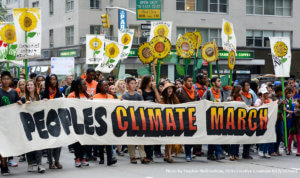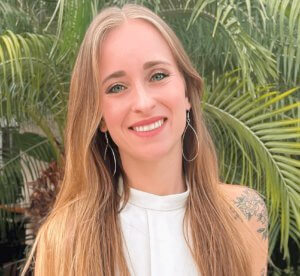Local Action: My Reason for Climate & Health Optimism in 2022
Last year was difficult for many reasons, and with multiple COVID-19 variants, wildfires, extreme winter storms, record-breaking heat waves, and the third-most active Atlantic hurricane season on record, many of us are understandably more concerned than ever about what the future holds for our climate and the health of our most vulnerable communities. With all of these cumulative impacts weighing on our mental health, it’s so necessary that we find hope together so we can move forward and continue this fight. Luckily, there are advocates across this country giving us just that.
The increasing passion, persistence, and power of youth climate activists gives me hope for the future of climate action. From the students at Harvard, who finally succeeded in pushing the institution to divest its $42 billion endowment from fossil fuel companies; to the plaintiffs in Montana, who are winning legal battles to hold the government accountable for jeopardizing their future; to the young people all over the world, who are marching and calling on their leaders to act on climate solutions commensurate with the severity of the catastrophe their generation is facing. Much of our progress in the coming years will be thanks, in large part, to them.
Equally as encouraging are environmental justice groups and advocates across the U.S. that have been building power for decades as they fight against the polluters in their backyards and the regulators who have neglected them. This past year, we’ve heard these voices get even stronger as they continue to organize and win landmark victories.
This includes the residents of Boxtown, Tennessee, who successfully halted the construction of a pipeline that would have endangered their drinking water and lowered their property values as yet another oil project targeted at their historically Black community. It includes residents of the majority-Black neighborhoods surrounding the largest urban oil field in the country, who successfully pushed Los Angeles County supervisors to phase out new and existing oil and gas drilling projects after a 1,600-gallon oil spill in April threatened their health. Overcoming the weight of historical power imbalances, these communities are proving that they won’t be seen as the “path of least resistance” any longer.


In fact, most of my current climate optimism comes from recent momentum at the state and local level. After several years of effort from advocates statewide, Illinois finally passed a climate bill that will catalyze an equitable shift to clean energy. Minnesota adopted clean car standards after a concerted public campaign to reduce health-harming air pollution and greenhouse gas emissions from the highest-emitting sector in the state. The Passamaquoddy Tribe in eastern Maine was able to raise the funds to reacquire 150 acres of land that was stolen from them in the late 19th century, successfully halting planned real estate development and timber production. Communities are coming together to engage in their own climate adaptation and resiliency planning in New York City, creating programs for disaster preparedness for farmworkers in North Carolina, and working to mitigate flood and heat risks in Austin, TX.
These are just a few examples of the incredible work being done by communities nationwide to ensure we have a chance of meeting this country’s climate commitments. Many others across the U.S. are working tirelessly to advocate for reducing emissions, protecting public health, and increasing resilience, especially in low-income and communities of color that have borne disproportionate burdens of the climate crisis.
If you’re feeling hopeless or are questioning your ability to influence such an overwhelming and global issue, I encourage you to remember that climate action is where you are. If we all continue to spread awareness, share resources, and appeal to decisionmakers at every level, we can meet our climate and environmental health goals together.


Katherine Catalano is the new Deputy Director of the Center for Climate, Health and Equity at the American Public Health Association (APHA), a partner of Climate for Health. Sign up for action alerts and legislative updates from the APHA; receive quarterly newsletters from the Center for Climate, Health and Equity; or connect directly with Katherine.